by bestevez | Sep 14, 2017
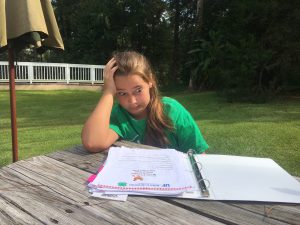
No need to dread the record book! This article breaks it down into simple steps.
In 4-H, young people have tracked their activities, events, profits and losses, skill development and learning experiences, and much more using the iconic 4-H Record Book. In addition to record keeping, the 4-H Record Book gives members an opportunity to reflect on their year, measure their achievements and growth, set goals, and develop plans to meet those goals. Once you understand the purpose and value of record books, you are probably wondering where to start. Here are the most frequently asked questions about record books to simplify the process:
What’s the difference between a project book and a record book? A project book guides youth through the project and includes background information and activities to help them master the subject matter. A record book is the record of what youth did and learned in the project and documents goals, knowledge and skills gained, leadership experiences, awards earned, and service to the community. Record books are typically bound in a cover, scrapbook or three-ring binder and turned in for evaluation at the end of the project or 4-H year.
Some project books include a records section, but many do not. If your project does not have a section for records, then you will want to insert a Florida 4-H Project Report Form (based on your age level).
What types of information should I keep track of for my record book?
|
Cloverbuds |
Juniors |
Intermediates |
Seniors |
| Personal information |
Name, 4-H age, club, # of years in 4-H, member, parent/club leader signatures |
| Project Plans and Goals |
NA |
What are your goals (run for office, attend a workshop, earn a blue ribbon in showmanship) |
| Project Highlights |
A list of activities you did this year (demonstrations, field trips, leadership activities, workshops, exhibits) |
| Project Attachments |
Photos of you doing project activities; newspaper clippings, club or workshop programs, exhibitor tags, cage cards, feed tags |
| Project Story, or Reflection |
NA |
What you learned, who helped you, what you liked (or disliked) about the project, what you would do differently next time, whether or not you encountered any problems and what you did to overcome them |
| Financial Records |
Financial records are usually only associated with animal science, gardening and entrepreneurship projects. Not all record books will have a financial record section. |
How do I keep up with all that information?
| Calendar |
Have a calendar dedicated to your 4-H work and record your activities- club meetings, workshops, how often you feed or water your project, shows or exhibits, etc. |
| Index box |
Keep a recipe box full of index cards with dividers for each section of the record book. Each time you do something related to one of the sections, write it on the card. |
| Notebook |
Keep a journal of your project, recording activities. You can even divide the notebook into sections that correspond with each section of your record book |
| Electronic Device |
Yes! There is an app for that. Sponsored by Tractor Supply and National 4-H Council, there is a market animal record book app you can download from iTunes. |
To inspire you, here are some quotes that Florida 4-H youth wrote in their record books:
- “As the VP (vice president) of my club, I had many opportunities to speak in front of a crowd. This has helped me in other aspects of my life such as school. I have become a better public speaker.”
- “I have taken bigger and better responsibilities. I learned to be responsible and to challenge myself to bigger expectations and to be kind, nice, and pleasant to others.”
- “4-H has given me the opportunity to do things that I normally would not get to do.”
- “4-H has meant a lot to me because it teaches me so much about my project and our world. (I learned) to follow safety practices, treating animals with respect, being careful when leading an animal and watching out for others and their animals.”
As we start the 2017-2018 4-H year, think about your 4-H project area and how you will document it this year. If you have a skill to share and would like to inspire the next generation, consider becoming a 4-H volunteer. We offer a wide variety of roles to fit your interests and schedule. For more information about 4-H, visit our website or contact your local UF IFAS County Extension Office.
by amgranger | Sep 14, 2017

Many youth (and parents) dread the 4-H Record Book
In the early years of 4-H, record books were a way to document profit or loss on a project, such as raising and preserving a crop or raising a herd of cattle. Over the years, record books have expanded to include topics like babysitting, robotics and sewing. However the reasons why 4-H encourages youth to complete record books is the same- it is one of the most effective tools in positive youth development. 4-H Record Books foster the Essential Elements of positive youth development through:
- Belonging: 4-H members are awarded for their participation in activities, earning symbols of belonging as they continue in 4-H (e.g. ribbons, achievement pins).
- Mastery: Through competition, 4-H members receive feedback on their participation and record keeping skills so they can improve and grow.
- Independence: 4-H members set and record goals and their progress towards those goals throughout the year. Record books also encourage members to participate in leadership development activities.
- Generosity: 4-H members are provided an incentive to engage in their communities through positive citizenship and community development activities.
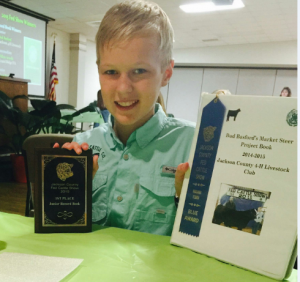
Record books are an effective way for youth to learn life skills.
However, record books are generally regarded as a chore young people; most fail to realize its value until they reach adulthood. However, many 4-H Alumni still have their record books and will be quick to point out that the process taught them multiple life skills such as:
- Time management and organizational skills.
- Responsibility
- How to set goals
- Preparation for completion of resumes and applications for awards, college scholarships, and jobs
- Financial literacy and keeping track of expenses
- Written communication
But what does the research say? Life skill development through record books is well documented. During a recent study, 4-H alumni were polled regarding their experiences in 4-H and the use of record books (Bikos, Haney, Kirkpatrick-Husk and Hsia. Journal of Youth Development, 2014). Alumni spoke of the real-world applicability of skills acquired during completion of record books to their adult life:
“It prepares us for life after we leave 4-H,” and “It has helped with a number of projects since I’ve left 4-H.”
Comparing skills learned in her Sewing/Needlework project to those gained from completion of record books, one alumnus said:
“Even though I’m not still doing clothing type things, I’m still doing things that I have to take records of.”
Leader perspectives voiced a similar theme but with a more parental tone:
“They may not be really aware of how this is going to relate in their real life, but it’s going to whether they know it, or like it, or not.”
Alumni and leaders who had completed record books reported that the experience helped them successfully apply for college, scholarships, and employment. While most used the record book as an organized resource for easily locating information (e.g., “It was all there for me which was amazing”), a few were able to use the actual record book itself. 4-H members in Florida refer to their record books when completing their 4-H Portfolio, part of the process for applying for state awards and scholarships.
If you have a skill to share and would like to inspire the next generation, consider becoming a 4-H volunteer. We offer a wide variety of roles to fit your interests and schedule. For more information about 4-H, visit our website or contact your local UF IFAS County Extension Office.
Next up, how to complete a record book (the easy way) by Escambia County 4-H Agent Brian Estevez.
Full research article on the benefits of 4-H Record Books
by bestevez | Jun 24, 2017
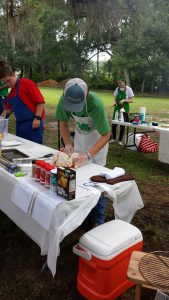
This contest teaches youth about meat science, food safety and communication skills.
Tailgating. The smell of charcoal in the air. Cooking over a hot grill. Earning lots of scholarship money?
The Florida 4-H Tailgate Contest completed its first year in 2016, giving out over $15,000 in scholarship money to 4-H members. This was made possible by sponsorships from Winn-Dixie, National Beef, and Sonny’s. In 2017, Sanderson Farms joins the list of sponsors for this statewide event.
While earning scholarship money is great, youth also learn many valuable life skills in the art of grilling. A curriculum series was developed (see below) to help youth learn about fire-building, meat selection, cooking safety, smoking and slow cooking meat, and cooking equipment. The Northwest District has been very proactive in hosting different tailgate and grilling day camps throughout the panhandle to further youth learning.
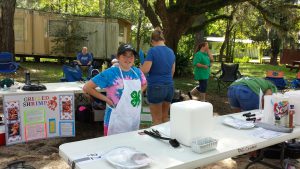
Youth demonstrate their knowledge during the district and state contests, and can win a college scholarship.
The Florida 4-H Tailgate Contest allows youth to grill two 6-8 ounce portions of one of the following proteins: beef, pork, poultry (half chicken or turkey breast), and headless, deveined, fresh shrimp. At each contest, judges will observe the food and fire safety of each participant and ask students questions about their recipe and safety knowledge. A team of judges will then evaluate the cooked product.
There are four contests hosted throughout the state including the South contest at 4-H Camp Cloverleaf, the Central contest in Dade City, the Northeast contest at the UF Horse Teaching Unit, and the Northwest contest held at the Washington County Fairgrounds. After youth compete at the local county contests/day camps, they can register for the district contest. The Northwest contest will be held on July 22, where the first place winner in each protein category receives $400, second place $250, third place $100, and fourth place $50. The top two winners from each protein area at the district contest are then eligible to compete in the state contest held at the University of Florida on October 14, 2017. For the state contest, the first place winner in each protein area receives a $1,500 college scholarship and the second place winner receives a $1,000 college scholarship.
We hope to see you at one of the many grilling opportunities offered throughout the Northwest District this summer through 4-H!
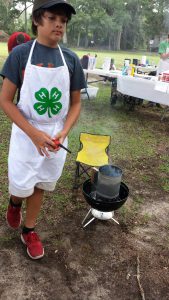 Day Camp Dates and Locations:
Day Camp Dates and Locations:
- June 5-9- Bay County Extension Office, Panama City, FL
- June 27-29-Holmes County Extension Office, Bonifay, FL
- June 27-29-Leon County Extension Office, Tallahassee, FL
- June 27-29-Liberty County Extension Office, Bristol, FL
- June 27-29-Washington County Extension Office, Chipley, FL
- July 5-6-Escambia County Extension Office, Cantonment, FL
- July 10-12-Walton County Extension Office, DeFuniak Springs, FL
Contact your local UF IFAS County Extension Office to inquire about other Florida 4-H Tailgating Day Camps and to register for the District Contest. For more information, visit these sites:
by Heather Kent | Jun 15, 2017
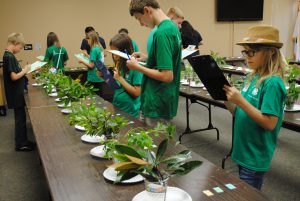
4-H Judging Contests, like horticulture identification, teach essential life skills for work and personal success.
Horticulture is one of our state’s leading industries, and for decades, the 4-H Horticulture ID contest has helped youth learn about this industry and demonstrate mastery of horticultural identification skills. Even if a youth does not pursue a career in the horticultural industry, learning the material for this contest can benefit them in other ways. To learn more about how judging teams teach workforce skills, check out this previous blogpost.
This year, the State 4-H Horticulture Judging Contest received an extreme makeover, to expand the program to even more youth. The state contest was held this past Saturday, June 10th at the Hillsborough County Extension Office in Tampa, FL (previously, the contest was held in Gainesville during 4-H University and was only open to 4-H seniors). For the first time ever, the contest is now open to youth between the ages of 8 and 18 (juniors, intermediates, and seniors). Study materials were adapted and revised to be age appropriate, and a webinar for coaches was offered. The webinar was archived and can still be viewed by anyone interest in coaching a team.
There are five parts to the contest:
- Woody Ornamentals identification
- Flowers and Foliage identification
- Fruits and Nut identification
- Vegetable identification
- Judging classes (youth look at a group of four fruits, plants, vegetables or nuts and rank them from best quality to poorest quality).
The contest is organized by a group of University of Florida Extension Specialists and volunteers. In addition to the resources online, youth can contact their local Master Gardener Program through their local UF IFAS County Extension Office for support. Many master gardener volunteers are willing to help teach plant identification, and may be willing to serve as a coach for your club. In fact, Master Gardeners can earn bonus points towards their state contest for helping 4-H clubs and teams prepare!
If this program interests you, sign up for 4-H! 4-H is open to youth ages 5-18. Adults can join 4-H as volunteers. Florida 4-H offers a variety of volunteer roles to fit your specific interests, skills and schedule. For more info, visit http://florida4h.org or contact your local UF IFAS County Extension Office.
Helpful Links:
by jgl1 | Mar 3, 2017
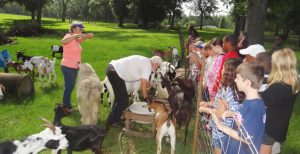
Fred and Bobby teaching a group of 4-Hers about goats.
Fred and Bobbie Golden relocated to Jefferson County from Lakeland, Florida in 2000 to establish Golden Acres Ranch LLC. The sixty-three-acre ranch is home to one of the largest mayhaw ponds in the region, grass fed goat & sheep, free-range chickens, guineas, pet boarding, and a country store.
Bobbie and Fred have genuine love for Jefferson County 4-Hers. Can you tell the difference between a sheep and a goat? Jefferson County 4-H campers can! For the past six years, 5-8 year old youth visited their ranch during 4-H day camps for some hands-on learning about agriculture. The campers have opportunities to feed, pet and learn important facts about Tennessee Fainting Goats, sheep, Pyrenees and Maremma, chicken, guineas and other animals reared on the farm.
Abagail Loveless, day camp participant said, “the reasons I like to visit Golden Acers Ranch, you get to feed, pet, learn things about the farm animals and swing on the tire/rope. “London Skipworth indicated that she was afraid of chickens, but with help and support from teen counselors and 4-H Staff, she was able to overcome her fears. London now plans to participate in the 4-H Chick Chain Project this year.
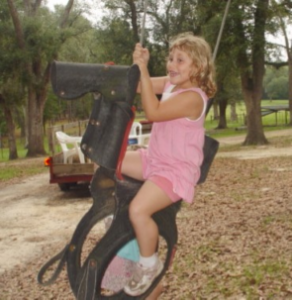
After a day of farming, Abigail enjoys a tire swing
Bobbie Golden, said “I like inviting the campers to the ranch because I like teaching them interesting facts about our farm animals, but most importantly bringing the youth back in touch with agriculture.”
Bobbie is a member of the Jefferson County Extension Ag Advisory and Vice President of the Overall Extension Advisory Committee. Bobbie also chaired the Extension Office open house committee. Bobbie and Fred support Jefferson County Extension in every capacity.
Annually, Jefferson County Extension participates in the Millstone Farm Tour and the Mayhaw Festival; both held events at Golden Acers Ranch. Each Extension program area provides interactive displays and hands activities for the youth and adults. For more information about Golden Acres Ranch, please go to https://goldenacresranchflorida.com/.
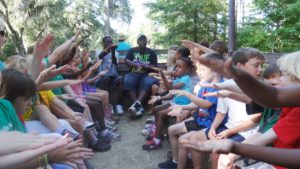
Campers leading songs on a hay ride around the farm.
by Heather Kent | Feb 23, 2017
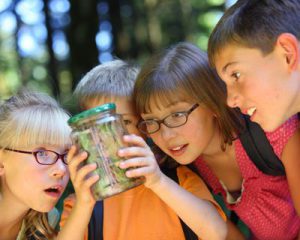
Photo credit: UF
There are two kinds of people in the world- those that think bugs are really cool and those that run screaming from anything that slightly resembles an insect. If you or a family member are the former, then prepare to be excited! We are happy to announce that there will be a new competitive event coming to Florida 4-H. It is being developed by a team of specialists, volunteers and youth who are passionate about the exciting world of entomology. The Florida 4-H Insectathon will be held January 20th, 2018 in Gainesville, FL and will include the following events:
- Insect Collection Contest
- Honey Bee Essay Contest
- Insect Art Contest
- Entomology Identification and Skill-a-thon Contest
- Educational tours for both contest participants and their family members
This event will help youth master skills such as how to use a dichotomous key, how to make observations, record keeping skills, pinning skills, and communication skills- it may even aspire some youth to pursue a career related to entomology! To help volunteers, parents and youth get started, the experts will be teaching a workshop here in the Panhandle on Saturday, May 6th, from 10AM-2PM. Registration is open March 1st through April 28th via 4HOnline. Participants will receive hands-on experience collecting, identifying and pinning insects, as well as a startup kit of resources to share with other youth in your county. Counties are encouraged to send a team of youth and adults to this workshop. Lunch will be provided, so there is a small fee of $15.00/person.
If you have a passion for nature and would like to inspire the next generation, consider sharing your expertise as a 4-H entomology project or resource leader. For more information, contact your local UF IFAS Extension Office, or visit http://florida4h.org.
Other Resources of Interest:










